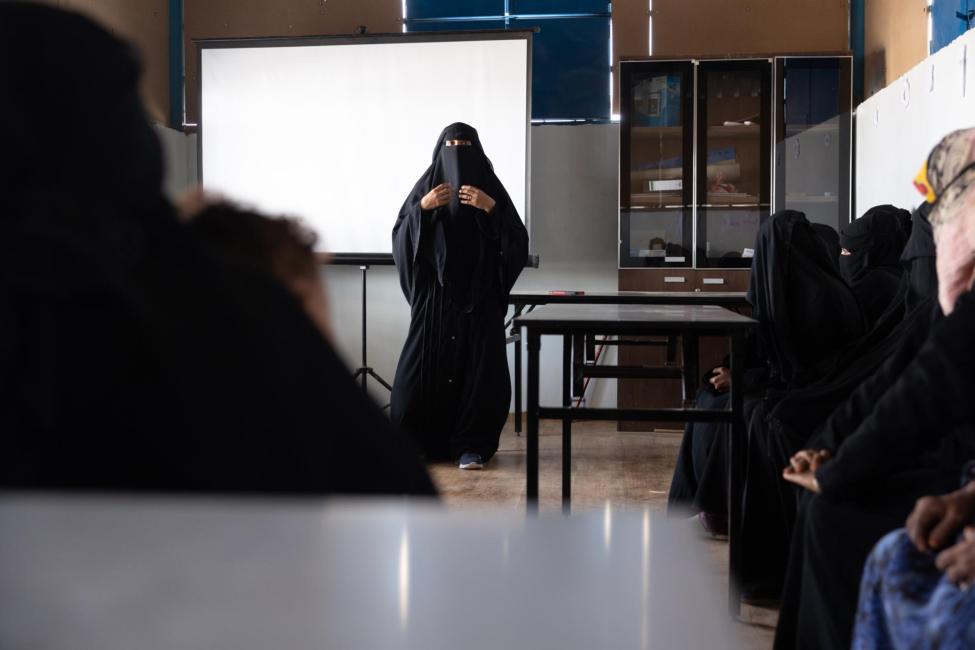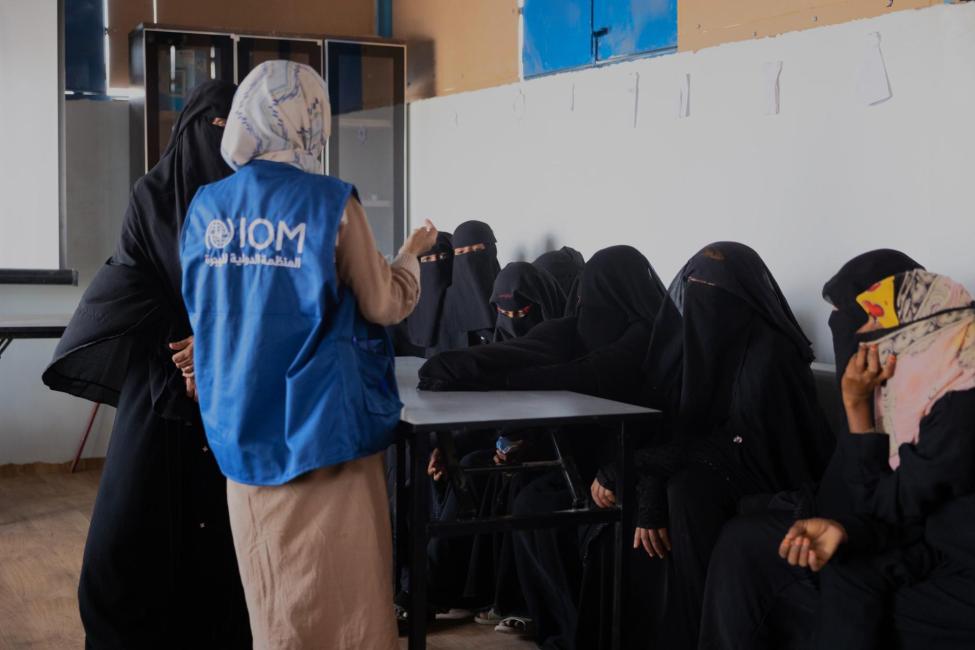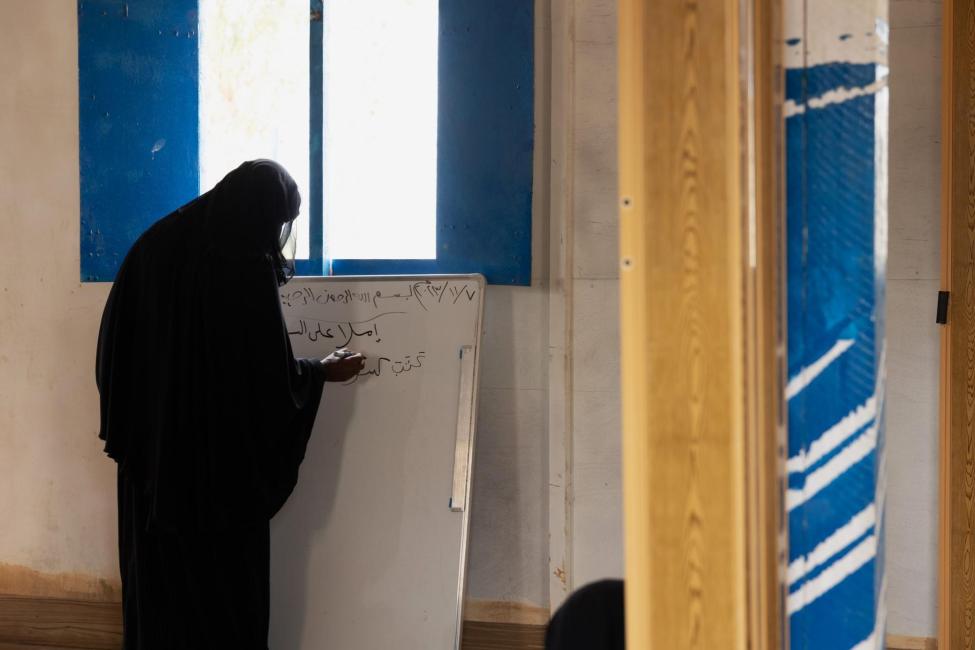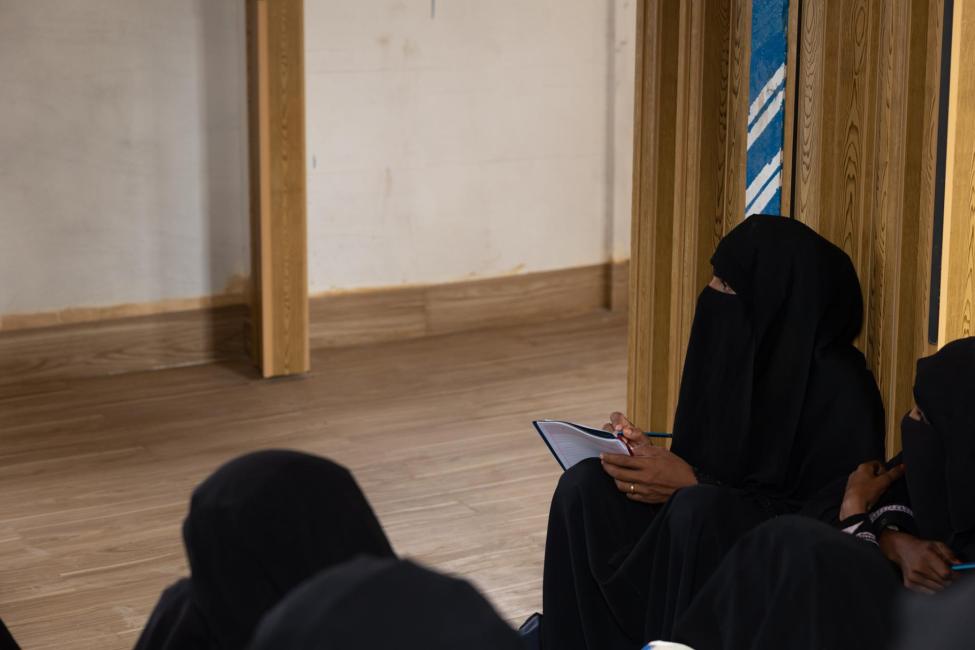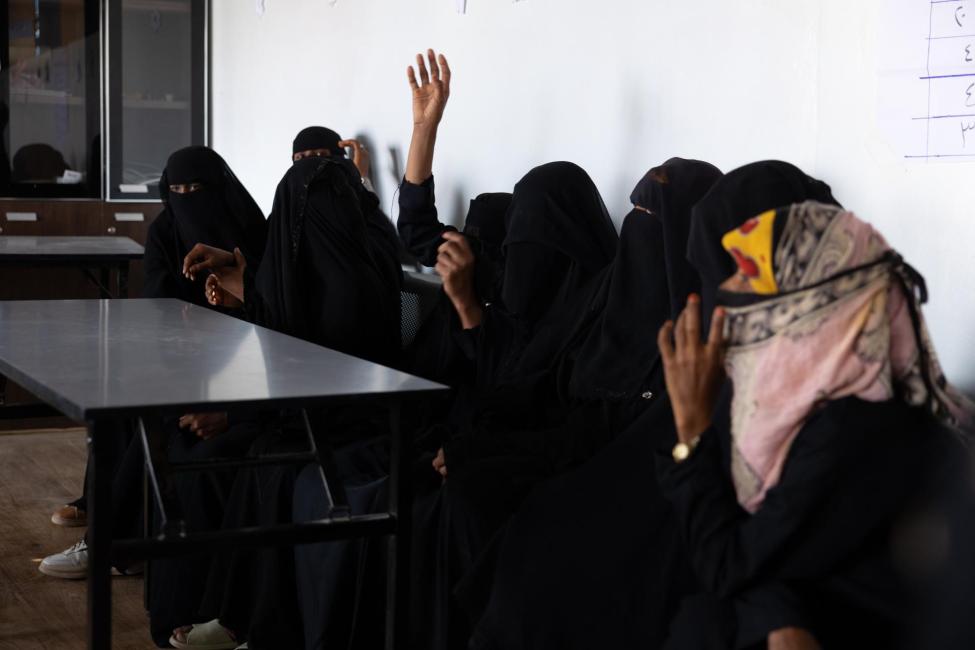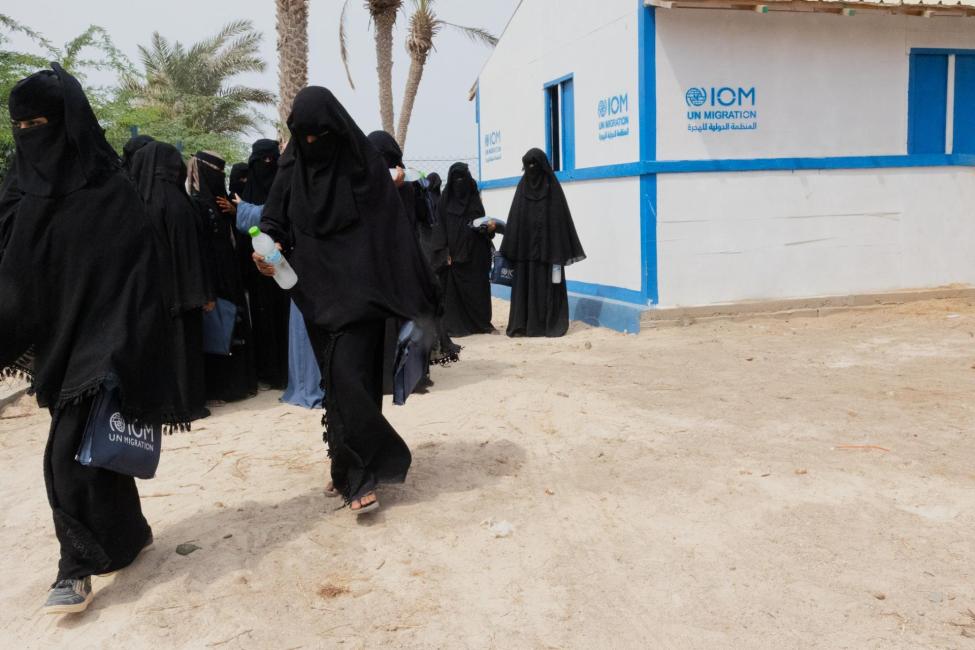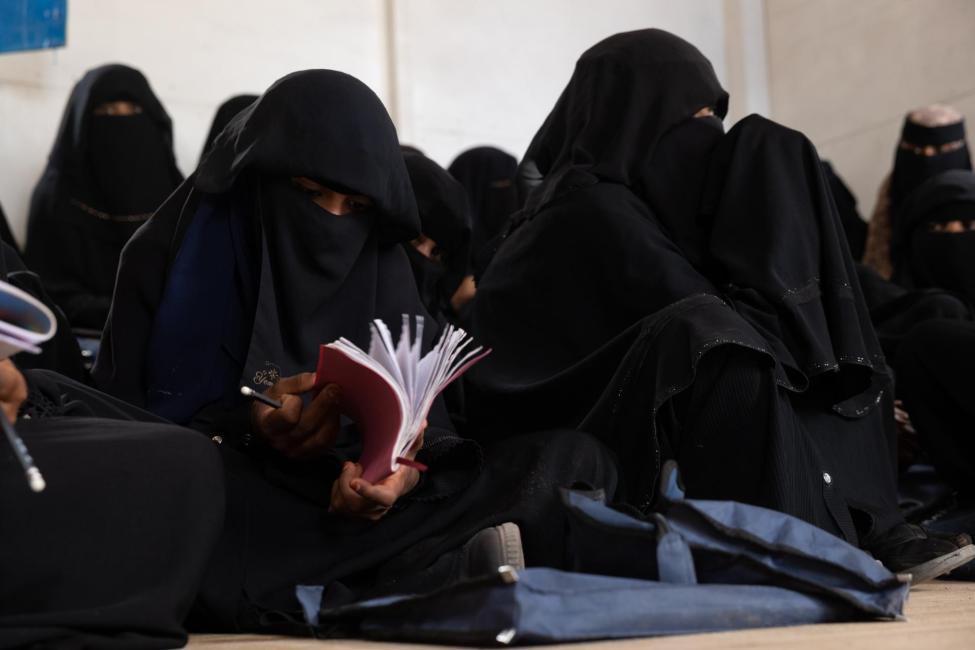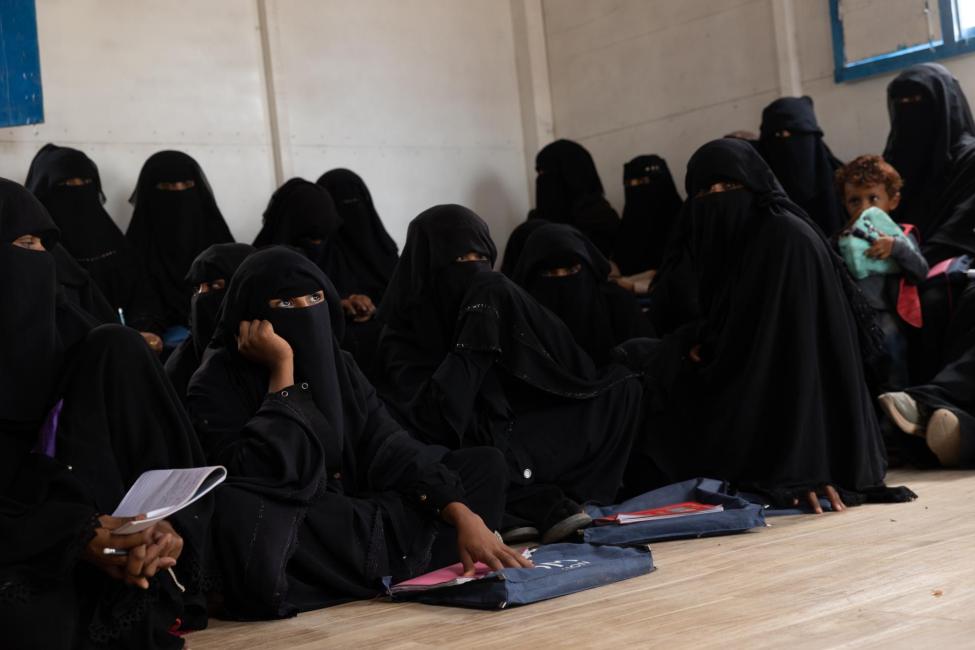-
Who We Are
WHO WE AREIOM is the leading inter-governmental organization promoting humane and orderly migration for the benefit of all, with presence in over 100 countries. IOM has had a presence in Yemen since 1994.
About
About
IOM Global
IOM Global
-
Our Work
Our WorkAs the leading inter-governmental organization promoting humane and orderly migration, IOM plays a key role to support the achievement of the 2030 Agenda through different areas of intervention that connect both humanitarian assistance and sustainable development. Throughout Yemen, IOM supports vulnerable groups including displaced people, conflict affected communities and migrants.
Cross-cutting (Global)
Cross-cutting (Global)
- Data and Resources
- Take Action
- 2030 Agenda
West Coast, Yemen, 12 December 2023 – “I bought milk one day, but I didn’t know it was expired until I drank it,” recounts Eqleem, a resident of Al Khukhah district, who could not read nor write until recently.
Growing up in a rural area meant that Eqleem and other girls in her village missed out on the chance to learn to read or write. Previously displaced from Hays, Al Hodeidah, Eqleem’s illiteracy often came in the way of her daily responsibilities as a housewife, preventing her from deciphering ingredients and expiration dates on food items.
After nine years of conflict, an estimated 4.5 million Yemeni nationals are internally displaced. Approximately 21.6 million people are estimated to need humanitarian assistance and protection services across the country.
The collapse of Yemen’s economy has drastically increased the population’s level of vulnerability, with more than 80 per cent of Yemenis now living below the poverty line. The crisis has taken a toll on the education system as well, with thousands of schools teetering on the brink, either destroyed, partially damaged, or repurposed for non-educational purposes.
“In this village, we don’t have any schools or teachers, so a significant portion of the population is illiterate,” explains Wafa’a, a community mobilizer with the International Organization for Migration (IOM) at the community centre in Al Khukhah.
“Women want to teach their children how to read and write, but they are unable to.”
Responding to this critical need, IOM recently launched literacy classes in five displacement sites in Ta’iz, reaching 150 women, as the demand continues to rise. To enhance their educational experience, IOM supplied them with school bags, notebooks, pens, and books, along with establishing study areas and mobilizing volunteer teachers from the community.
When volunteer teacher Sameera first arrived in Al Khukhah, she was surprised to find that many of the youth in the village were illiterate. She quickly learned that many girls had dropped out of school by second grade, robbing them of the chance to acquire literacy skills.
According to Sameera, girls in rural areas are often withdrawn from co-educational schools at an early stage due to conservative cultural norms. Despite these challenges, Sameera spared no efforts in teaching the women, and her dedication paid off.
Since joining the classes at the community centre in Al Khukhah, Eqleem feels more confident using her mobile phone and buying groceries from the market. “The women are now able to write their names for the very first time and even teach their children and husbands the alphabet,” Sameera explains.
IOM’s community centre in Al Khukhah was originally created as a platform for displaced people to voice their concerns and needs. Additionally, it serves as a safe place for women across 13 IOM-managed displacement camps in southern Ta’iz to express themselves.
The women’s participation projects were launched as a gateway for women to actively engage in camp activities. By encouraging women to contribute with various suggestions, IOM fosters interaction and shares information. In this collaborative process, women can not only enhance their participation in camp activities but also acquire valuable skills that contribute to their personal growth.
Displaced herself, Wafa’a found a job as an IOM community mobilizer upon her arrival in Al Khukhah, where her current role involves addressing complaints and organizing community activities. Together with her colleagues, she actively engages with displaced women in the community to address various issues and explore ways to improve their living conditions.
The UN estimates that three-quarters of the 4.5 million displaced people in Yemen are women and children, where around 26 per cent of displaced households are headed by women.
“Displaced people in this region live in very poor conditions, struggling to find ways to earn a living,” Wafa’a explains. “Many go through entire days without earning anything; some women may work for a full day on the farm for only USD 2.50.”
Every morning, Nawal’s husband, now unemployed, ventures with his sons in search of work, typically cultivating crops for daily wages. More often than not, they return with modest earnings, barely enough to sustain the day’s meals; at times, they go home empty-handed.
“We used to have a very comfortable life, relying on camels for sustenance, and our husbands had a steady source of income,” explains Nawal, a mother of seven. “However, after our displacement, we had no means to provide for ourselves anymore.”
The centre in Al Khukhah actively promotes the well-being of displaced families by organizing skill-building activities for women, such as sewing, hairdressing, henna tattooing, and straw weaving. At the centre, Nawal learned to make baskets, mats, hats, and bread containers that she now sells at the local market, driven by the ready availability of straw and a substantial demand for its products.
Having acquired this skill, Nawal now plays a pivotal role in sharing her knowledge with other displaced women. This ripple effect not only fosters a sense of community among internally displaced people but also equips more women with the means to generate income, contributing to a brighter future for both individual families and the broader community.
“Given that most women here are responsible for their households, our goal is to give them the tools to feel empowered, enabling them to provide for their families and play a vital role in their community,” explains Wafa’a.
The community centre in the city of Al Khukhah is funded by EU Humanitarian Aid, in the frame of IOM’s camp coordination and camp management activities.
